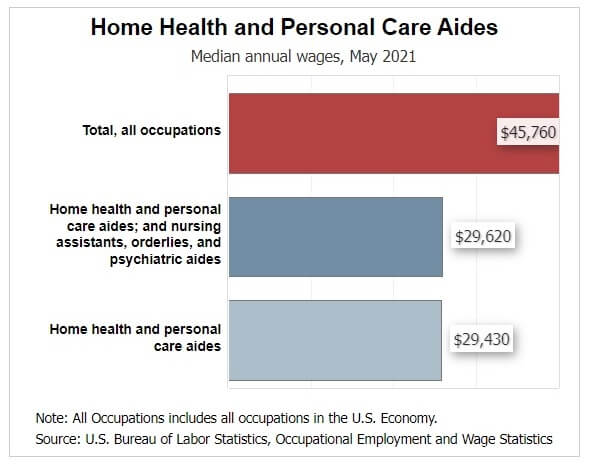Funding Increase for Ohio Provider Agencies DSPs, ICF & HPC

Categories: Waiver Provider Agencies & DSPs - Direct Support Professionals
July 8, 2023
Ohio provider agencies work diligently to deliver supportive services to people with developmental disabilities. Yet, funding to support these services is sometimes scarce. However, there have been some recent funding increases for DSPs, ICFs and agencies that deliver HPC services.
Many provider agencies find the lower salaries for their direct support professionals (DSPs) make it difficult to maintain staffing levels. The low pay creates a higher amount of direct care staff turnover.
In Ohio, the staff turnover rate for DSPs varies from 50 to 55 percent, which is higher than the national average.
Beyond the low wages, the type of work that DSPs and other similar direct care staff perform can quickly burn employees out. The challenging nature of the job, irregular hours as well as working nights and weekends; takes a toll on direct care staff. This is another reason that this industry has such high turnover rates.
In a similar manner, other related healthcare professionals are experiencing similar issues with burnout and high staff turnover rates.
What is the Median Pay for DSPs?
Across the United States, the average salary for a DSP or similar direct care worker is fairly low. According to the U.S. Bureau of Labor Statistics (BLS), the median annual wage for home health and personal care aides was $29,430 as of 2021. This wage is roughly half of the median annual wage of other occupations. The chart below displays these salary differences in stark detail.

The United States is a large country with sizeable wage differences appearing based on geographical location. This means that national averages are sometimes misleading. Wages in New York City are higher versus wages in rural Kentucky.
The previous salary data is the median for the entire nation. According to sources sponsored by the U.S. Department of labor, the median salary for Ohio home health and personal care aides was $23,740. Incidentally, the same some source list the annual median wage for home health and personal care aides at $27,080. It is unclear as to why there is a statistical difference in the reported salaries.
The state of Ohio has increased the hourly pay of DSPs from $11.12 to $13.23. This pay increase went into effect on January 1, 2021. Better pay for DSPs is still needed, but this is a step in the right direction.
Rate Increase for Homemaker/Personal Care Services:
Ohio initiated a rate increase for providers who deliver Homemaker/Personal Care (HPC) services. The pay increase went into effect starting on January 1, 2022. Overall, the maximum payment rates for Medicaid were increased for both Homemaker/Personal Care (HPC) and Participant-Directed Homemaker/Personal Care (PD-HPC).
Agency providers in the state of Ohio will have to submit the new payment rates when billing their DODD claims. It is important to note that HPC providers who submit claims at a lower rate than the new maximum, will receive the lower reimbursement rate.
The increased funding for HPC providers is welcomed. Recent federal and state mandates are requiring agencies that deliver HPC services to include an EVV system in their billing process. These funds can be used to offset this new cost, even though a good EVV and billing service can save money in the long run by helping an agency operate more efficiently.
If an Ohio provider agency is not using an EVV solution, they should closely monitor their submitted claims. The state has mentioned that agencies delivering HPC services should be using an approved EVV system.
Additional Funding for Ohio ICFs:
In March 2022, the state of Ohio allocated additional financial resources to intermediate care facilities (ICFs). The relief payments were initiated through an executive order by Governor Mike DeWine.
The emergency funding authorized 60 million in relief payments to Ohio ICFs. The funding was coordinated by the Ohio Department of Developmental Disabilities (DODD) as well as the Ohio Department of Medicaid (ODM). The supplemental funds were distributed to ICFs who were considered in good standing with the state.
Like many other healthcare providers, ICFs were severely impacted by the COVID-19 pandemic. They are a crucial option in the delivery of supportive services for individuals with developmental disabilities. Due to this fact, ICFs continued to provide essential services even through the worst of the pandemic. Funding guidelines stipulate that all ICFs must use their relief payments to compensate their direct care staff.
About RevUp Billing
RevUp Billing provides experienced and professional billing/software services for I-DD provider agencies.
If you have additional questions about billing practices for Ohio provider agencies - contact us.
RevUp Billing provides trusted and experienced billing services for healthcare practitioners. Like, subscribe and follow RevUp Billing on Facebook, Instagram, LinkedIn & Twitter.
Updated from original article published on May 6, 2022
Categories
Have a question? Get in touch with us!
For an in-depth proposal on our services, complete our contact form to request a proposal. We'll get back to you asap.
Contact UsPopular Articles: DSPs
Popular Articles: I-DD Provider Agency
Popular Articles: eWebSchedule
Additional News
Search for information and news on provider agencies for individuals with development disabilities, billing trends as well as other related topics.